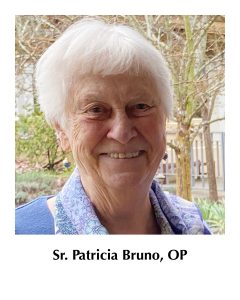- All
- Wisdom
- We Stand on Their Shoulders
- Vocation
- Uncategorized
- Stories Seldom Heard
- Spirituality
- Social Justice
- Prayer
- Peace
- Oneness
- Love
- Letting Go
- Lent
- Joy
- Inspirational Images
- Hope / Healing
- Holy Week
- Gratefulness
- God's Presence
- General News Stories
- Forgiveness
- Finding God
- Faith
- Easter
- Dominican Saints
- Discipleship
- Courage
- Christmas
- Catholic Sisters Week
- Care of the Earth
- Blessing
- Beauty
- Advent
- #justiceOPportunity
Listening: A Gift of the Holy Spirit
Sr. Patricia Bruno, OP

286th Edition – May 2023
The Acts of the Apostles – Chapter 10
Listening: A Gift of the Holy Spirit
 Throughout April and much of the month of May the first reading at Mass is from the Acts of the Apostles (Acts). Tremendous growth comes as a result of the early Christians’ experiences. Profound insights are revealed in their lives: trials, prison sentences, stressful decisions, and conversions. New heroes/heroines arise who speak on behalf of their newly found faith. All of these situations and people help the early Christians and us, explore our mission as followers of the risen Christ. Yet, the daily readings at Mass skip over many of the conflicts and intense discussions that led to the changes that took place in the early Church’s development. These experiences are rich in content and informative especially in our world today. They remind us that change and development are part of the DNA of our church’s history.
Throughout April and much of the month of May the first reading at Mass is from the Acts of the Apostles (Acts). Tremendous growth comes as a result of the early Christians’ experiences. Profound insights are revealed in their lives: trials, prison sentences, stressful decisions, and conversions. New heroes/heroines arise who speak on behalf of their newly found faith. All of these situations and people help the early Christians and us, explore our mission as followers of the risen Christ. Yet, the daily readings at Mass skip over many of the conflicts and intense discussions that led to the changes that took place in the early Church’s development. These experiences are rich in content and informative especially in our world today. They remind us that change and development are part of the DNA of our church’s history.
The early Christian communities were a mixed bag of people. Some were Jewish converts and accustomed to strict observance. Others came with no particular religious background. Many questions arose as this ancient church developed its structure, beliefs, and practices. Change is never easy. We hear of one of the major issues that the Church had to face in Acts Chapter 10. Reading this chapter gives us insights into how conflicts were addressed and resolved. Deep listening is always an essential part of resolving conflict and building Spirit-led relationships.
In Chapter 10, we find Peter in a quandary. It’s a time of great consternation for him. Until this situation confronted him, he thought his mission was only to the Jews. No wonder he was hesitant when the messengers of the Roman centurion Cornelius arrived at his house. Peter was slow to receive them. Yet, he opened his heart and welcomed the strangers. Peter was no fool. Faced with serious questions, he relied on his past learnings. Peter drew on the power of prayer. He studied the circumstances and entered into a sincere dialogue with the messengers and Cornelius’ community. Emboldened by the Holy Spirit he had the courage to make a radical decision. “The truth I have now come to realize is that God does not have favorites, but that anyone of any nationality who fears God and does what is right is acceptable to God” (Acts 10:35). After Peter announced his decision, the Holy Spirit came down on those who were gathered. Notice! This time the Spirit came down “on all the listeners”- gentiles and Jews alike. (Acts 10:44) God speaks to all those who listen!
Listening to our partners, friends, spouses as well as people with whom we disagree is the first step toward conversion. Listening is particularly important, at this time of our lives since so many conflicts arise because of our inability or unwillingness to “hear” the other. Yet, when we listen with a purity of heart the Spirit fills our hearts and blesses our conversations and assemblies.
Pope Francis will be known for many Spirit-led decisions, insights, and practices.
Early in his papacy he led the church in the Year of Jubilee. The opening of the doors of the church was not just a symbolic ritual. It was an expression of his and the church’s desire to open our doors to the world. An open door, like a two-way street, gives us the opportunity to go outside our sacred spaces and traditional boundaries. The opening of the many church doors throughout the world was literally an invitation for us to enter into dialogue with the larger world that surrounds us.
Throughout the ten years of Pope Francis’ papacy, he has shown us the power of prayer, respect for others, and a sincere desire to listen deeply to those with whom he is working. His working partners have been broad! His encyclical Laudato Si; the many books he has published; his collaboration with a broad spectrum of religious leaders; and the many synod gatherings in almost every continent, all reveal Pope Francis’ desire to form a papacy that protects creation and is in service to all people especially the marginalized. All of these works have been done with great respect for those with whom he has worked. They also illustrate his sincere desire to hear the many voices of our modern world, so we, the disciples of Jesus, will be able to more attentively serve all creation. Pope Francis reminds us that respectful dialogue is grace-filled. When we listen with our hearts and minds, the Spirit can bless the whole assembly and lead us to metanoia – an ongoing, Spirit-led conversion. Its reward is greater understanding, peace, and joy.
The Pope has laid out a “listening welcome mat” for all people, especially those who have been overlooked, misunderstood, discriminated against, and marginalized by some Catholic teachings and practices. In many different ways, in a variety of circumstances, Pope Francis has said that he wants the church to be a “service church” devoid of all its court trappings. In all of his encounters, diverse as they are, he has the same focus: a resolve to listen.
Listening doesn’t seem like an extraordinary practice, but it has proven in Pope Francis’ life and, if we reflect on our own lives, to be a game changer. Listening carefully to another person’s concerns can change our hearts and minds. The Pope has not been afraid of immersing himself in a world that is broken. He has listened to those who need to speak and those who have been silenced by pain, confusion, or shame. He asks us to do the same: to enter into the confusion of life with all of its complexity and listen to those whose voices have been excluded.
As we read the Acts, the disciples have significant decisions to make. How are they to live out their discipleship in light of Jesus’ life, death, resurrection, and the realization that the Holy Spirit is leading them into an unknown future?
This year, as we continue listening in our Synod groups is another year of learning and listening to people whose lives might look very different from ours. Trying to understand another person is not easy. But listening intently to another can build a bridge of respect and lead to significant insights between people who hold very different points of view. Listening also is part of our individual discernment process as we try to understand what God is asking of us at this time in our lives.
Renewing our commitment to the Synod process is a dangerous invitation to accept unless we are prepared. And we are prepared! Like Peter, we can listen to the Spirit who guides us and the Church in our decisions. We can lean on the strength, balance, and insights we have gained from prayer. We can draw on our capacity to center ourselves through regular meditation practices. We can rely on our capacity to sincerely express our compassion for others…and more! We can trust the sound information we have gleaned over many years of study including the more recent documents that Pope Francis has written (1). Listening attentively and intentionally to others is a grace-filled practice.
Where do we begin? We could begin with those who are closest to us. We could broaden our focus, as the Pope has illustrated, and go beyond our usual boundaries. Reading and listening to the lives of people with very different life experiences from our own can be extremely enlightening. No matter what side of the fence we find ourselves on, it is important to hear the other side of the story from someone who sees life from a different vantage point.
Mary Oliver sounds rather unforgiving in this poem, but maybe on some days, we need to remember her words.
What I Have Learned So Far
Meditation is old and honorable, so why should I
not sit, every morning of my life, on the hillside,
looking into the shining world? Because, properly
attended to, delight, as well as havoc, is suggestion.
Can one be passionate about the just, the
ideal, the sublime, and the holy, and yet commit
to no labor in its cause? I don’t think so.
All summations have a beginning, all effect has a
story, all kindness begins with the sown seed.
Thought buds toward radiance. The gospel of
light is the crossroads of — indolence, or action.
Be ignited, or be gone (2).
Footnotes:
1. The Joy of the Gospel, Laudato Si (Encyclical on Climate Change and Inequality), The Name of God is Mercy, Amoris Laetitia (The Joy of Love), Let Us Dream.
2. Oliver, Mary, New and Selected Poems, Volume 2, Beacon Press, Boston, 2005. p. 59
